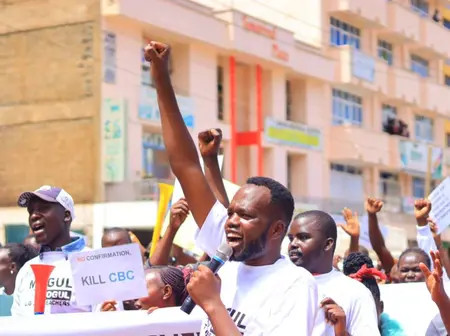The Teachers Service Commission (TSC) has taken the first step to make junior secondary schools (JSS) independent institutions.
In a trickle down order, the Commission has directed immediate appointment of one junior school teacher to act as Deputy Principal of junior school section.
The County and Sub County Directors have been tasked to ensure each primary school hosting junior school has a Deputy for junior school in acting capacity and the name forwarded to the Commission headquarters.
This comes just days after the JSS teachers pushed for autonomy of the institutions which are currently being hosted inside primary schools.
However a junior school teacher must be on a permanent and pensionable (pnp) basis to qualify to act as Deputy Principal.
Currently the primary school headteachers are acting Principals in junior schools. TSC gave them one year contract to act that runs from 1st January to 31st December 2025.
This move is highly welcomed by the junior school teacher who have persistently demanded independence from primary school management.
Often times the teachers have collided with primary school headteachers who they accuse of high handedness, corruption and incompetency in management.
A significant number of JSS teachers have been dragged to Curriculum Support Officers (CSOs) and Sub County Directors offices for violating code of conduct for teachers.
However the teachers have cited these moves as mere intimidations to muzzle them from calling out bad management by the school administrators.
Though the Presidential Working Party on Education Reforms (PWPER) proposed combining Nursery, Primary and Junior schools into one institution called Comprehensive school this was not adopted.
Ministry of Education officials have often times warned schools against naming them as Comprehensive saying this is still a proposal and not to be used officially.
There are fears the government is shying away from making junior schools independent because of the huge cost that it will come with.
The independent institutions will need independent infrastructures and school administrators which is a toll order for government that is struggling to pay external debts.
Two weeks ago both the Kenya Union of Post-Primary Education Teachers (Kuppet) and junior school teachers protested wanting the new learning level granted full autonomy, separate from primary and senior schools.
The Kenya Association of Junior School Teachers (KAJST), Kuppet and the more than 50,000 tutors are demanding administrative independence and recognition of junior school as its own tier in the education system.
The association argues that the current arrangement, which places the institutions under the primary school administrative structure, undermines the professional growth and career development of junior school teachers.
“A good example is promotions. How can a headteacher, deputy head teacher or senior teacher-who does not even qualify to teach in junior school-supervise junior school teachers?” asked association chairperson James Odhiambo.
He noted that most primary school administrators, including headteachers, lack the qualifications to teach or fully understand the needs of junior school learners and teachers.
Kuppet Deputy Secretary-General Moses Nthurima questioned the legitimacy of the “comprehensive school” model.
“Kenyan education law only recognises pre-primary, primary, secondary and tertiary levels. So, where is the ministry getting the term ‘comprehensive school’? Under the Competency-Based Curriculum, junior school is meant to be part of high school-or at the very least, operate distinctly from primary level,” he said.
He further argued that junior schools should have independent management structures and be staffed exclusively by teachers trained for secondary education.
“When graduate teachers are subjected to supervision by P1 (primary-level) teachers, it contradicts their legitimate professional expectations. These teachers trained with the understanding that they would work alongside their peers in secondary schools,” he said.
In response, Kenya National Union of Teachers Secretary-General Collins Oyuu urged junior school teachers to respect the recommendations of the education task force.
“Do you know that 90 per cent of our head teachers are graduates? Many were graduates long before some of these teachers even entered the profession. In leadership, qualifications alone don’t count, experience does. Do they even have leadership experience?” he asked.
Mr Oyuu dismissed the push for junior school autonomy as a settled matter, citing recommendations by the Presidential Working Party on Education Reform.
He said the task force clearly defined two sections within Basic Education: Comprehensive school (Grades 1-9) and Senior school (Grades 10-12).
“Let’s stop making wild proposals. They are teachers and professionals; they should avoid activism,” he said.
The association vowed to continue pushing for autonomy, saying it will keep engaging policymakers, education stakeholders and the public until junior school is recognised as a distinct level of education.

Leave a Reply